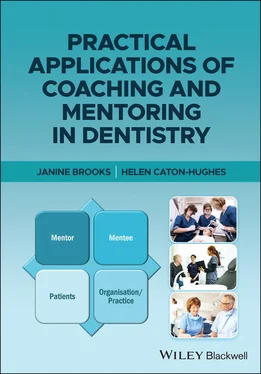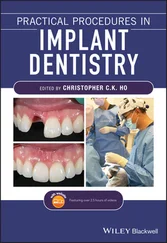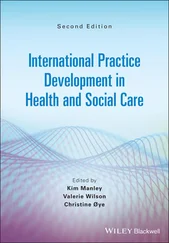The idea that practice owners might learn from Foundation Trainees (FTs) goes against traditional professional practices, where more experienced dental professionals provide the most input, make decisions, and provide mentorship to newer professionals with less experience. Nonetheless, the fast‐moving developments in technology, materials, and techniques in dentistry has reversed this logic; older professionals may have experience and insight, but lack skills in newer technologies and may not always recognise their potential.
Being mentored by a new colleague, takes a shift in attitude; it's an opportunity for give and take, where individuals share their knowledge, boosting everyone's understanding and improving overall communication and collaboration.
Reverse mentoring plays an important role in bridging intergenerational gaps: baby boomers (born between 1946 and 1964), Generation X (born between 1965 and 1976), and Generation Y, also called millennials (born between 1977 and 1996). A new generation is entering the workplace, Generation Z (born from 1997 onwards). In any one dental practice it will be commonplace to find four generations of dental professional working together. This will present both great opportunities and great challenges.
These groups have experienced vastly different social and cultural situations, resulting in varied work ethics, mindsets, and attitudes.
This has led to prejudices and stereotypes forming. For instance, some people view millennials as spoiled, unmotivated, and self‐centered, while some millennials view older generations as inefficient and resistant to change.
Professionals need to learn how to cross the generational divide and communicate with, motivate and engage colleagues. Reverse mentoring challenges these stereotypes, and benefits team members, patients, and organisations alike.
Inter‐professional Group Mentoring
This could be the most challenging mentoring format for some dental professionals to appreciate. This type of mentoring is when a mentor from one professional group, for example dentist mentors someone who is from a different professional group, for example dental nursing. Both mentor and mentee are dental professionals, however they undertake different roles. Whilst for some it might seem reasonable for a dentist to mentor a dental nurse and indeed it may be, the real challenge is when a dental nurse mentors a dentist. That may seem less reasonable. Or is it? This aspect of mentoring is covered within the discussion chapter.
The Roles of an Effective Mentor
The Mentor may help their mentee to do a current job more effectively, offer insight into potential career paths or support the mentee's motivation or ambition. In dentistry this is classically seen within the Educational Supervisor (ES)/FT/Vocational Trainee (VT) relationship. The mentor may have, and be willing to share, access to networks and connections, or have insights into personalities or relationships, of potential value to the mentee.
Many organisations and some practices that have mentoring programmes rely on the goodwill of senior dental professionals to volunteer their time. It's called ‘giving back’ to your organisation and to the profession.
Some great people mentor in this way, and their knowledge and experience is invaluable. However, there is no guarantee that such well‐meaning volunteers will understand how to truly share all they have to offer or how to get the best out of their mentees.
The best mentoring programmes are based on formal training. That way, the mentor learns how best to pass on their wisdom and the mentee benefits from a more professional approach – a classic win–win.
The mentor may act at times as a teacher or adviser, or at other times more like a coach. The range of skills or approaches used may include training, advising, and career counselling. Understanding the distinctions between counselling, advice‐giving, coaching, and other ‘talking’ interventions is important.
Mentors support mentees to explore their goals and provide the knowledge and experience to underpin their development. One key difference between ‘teacher’ and ‘mentor’ is that the teacher is an expert who shares information that they know with students, it is a one‐way feed. In contrast, a coach may not be an expert or specialist in their coachee's field. They draw out solutions and clarity from the coachee, rather than put them in. Information sharing is not the coach’s primary role. These differences are described in Table 1.1, Chapter 1.
Darling (1984) proposed a list of 14 characteristics and roles of an effective mentor:
Role Model – Upholds high standards and professionalism. Well respected by peers whom the mentee ‘looks up to’ and holds in high regard. A powerful position of influence.
Envisioner – Motivating, inspiring, and enthusiastic. Uses situations as opportunities to learn.
Energiser – Keen to embrace change, improve care, and to encourage the mentee to see beyond the present and seek more.
Investor – Gives their time, knowledge, and experience freely. Delegates responsibility to the mentee.
Supporter – Willing to listen, encouraging. Humanistic and empathic in approach. Takes account of mentee anxiety and needs.
Standard prodder – Seeks to improve standards. Demonstrates up to date knowledge.
Teacher‐coach – Passes on skills and competence, guides, sets up learning experiences, allows time for practice. Encourages personal and professional development. Provides and organises learning opportunities. Willing to share knowledge.
Feedback giver – Gives constructive feedback, identifies future learning. Skilled questioner; facilitates reflection.
Eye opener – Shows mentee the wider picture, e.g. politics, management, research.
Door opener – Points out and brokers learning opportunities and resources.
Idea Bouncer – Helps mentee reflect and generate new ideas, open to discussion and exploration of the literature.
Problem solver – Helps mentee develop problem solving skills. Supportive when a mentee is struggling.
Career Counselor – Gives guidance upon future directions and possibilities.
Challenger – Helps mentee develop critically and encourages them to question and challenge views and prevailing norms.
Clearly a good mentor can be many different things to many different people. To what extent these roles will be utilised will depend on the issues a mentor is assisting their mentee with.
When mentoring for remediation the standard prodder role is important. When mentoring for personal development useful characteristics/roles are door opener, feedback giver, and idea bouncer.
Mentors have skills and qualifications and in particular skill‐sets which, combined with their real‐world experience of applying those skills, helps them to transfer that knowledge in a personal way.
For example, in dentistry a mentor may have business and commercial knowledge which, in combination with their clinical skills, offers insight into how to build a dental business.
What Can Mentoring Achieve?
Mentoring is a fruitful partnership at all stages of a dental professionals' career from the early days to preparing for retirement. Good mentors are independent, they support those who are struggling and guide personal development.
It can be hard to talk about your personal development needs with your boss, line manager, or even a trusted colleague. After all, they write your appraisal or debate your pay rise!
Finding a good mentor can be invaluable in improving confidence, providing insight, and identifying opportunities.
As Figure 2.2below illustrates, mentoring can achieve benefits for the mentee, the mentor, for patients, and the whole organisation or practice.
Читать дальше












